Yesterday at the Multnomah Athletic Club, about fifty members of the Portland Ambassadors (a business development organization partnered closely with the Portland Development Commission) attended a forum to learn more about our local bicycle industry. They heard from a broad range of perspectives about how bicycles play an increasingly significant role in our region’s economy.
Oregonian Columnist and Cycle Oregon founder Jonathan Nicholas was perfect as the moderator and his introductions of each panelist were one of the highlights of the event (unfortunately I had a technical glitch and cannot share any audio clips).
The speakers included:
- Tom Miller, Chief of Staff for City Commissioner Sam Adams
- Mia Birk, principal of Alta Planning and Design
- Greg Cowan, owner/CEO of Castelli
- Jay Graves, owner of The Bike Gallery
- Sacha White, owner of Vanilla Bicycles
- Jerry Norquist, Director of Cycle Oregon
Nicholas introduced them as the people who, “use pedals to drive the economic engine of the region.”
First to the microphone was Sam Adams’ Chief of Staff Tom Miller. Miller spoke highly of the need for more investment in bicycles. He said it’s, “not just the right thing to do, it’s the thing to do.”
The first presenter was Mia Birk, who knows a thing or two about investing in bicycles. Birk was hired to lead Portland’s bike program in the late 1990s’ by then-Commissioner Earl Blumenauer.
With Birk at the helm, Portland invested heavily to lay the groundwork for the facilities we all enjoy today. She told the assembled crowd about findings from her report on the economic impact of bicycles in Portland which she completed last June.
Next came Greg Cowan. When Cowan took over Castelli they were floundering financially, now they’re flying high and back at the front of the pro peleton. Cowan — who served a stint as Global Sales Director for Nike — walked the crowd through a crash course in jersey and bib short design.
He said that bike clothing is the “most technically demanding of any sport,” and showed off his company’s latest, high-end jacket; a “Rosso Corsa” model that retails for around $375. Cowan said he’s,
“Happy to be in Portland, happy to be back in the black, and happy to have one less competitor (referring to the recent news of Nike bowing out of the cycling clothing market).”
No discussion of Portland’s bicycle business would be complete without ubiquitous advocate and industry statesmen Jay Graves. Graves shared his enthusiasm for Shimano’s Coasting initiative and his rosy visions of bike use in Portland. Citing a 33% rise in bike commuters in the past two years , he said Portland has reached the “tipping point,” in bicycle ridership.
Besides being a bike-friendly city, Portland also has a stellar reputation for small, custom framebuilders. To present that perspective was Sacha White of Vanilla Bicycles. In his introduction, Nicholas said, “What Tiffany is to pearls, Sacha White is to bicycle frames.”

White shared his humble beginnings, from starting in his garage with “some hand tools and files” to the challenges and opportunities presented by his current four-year waiting list.
White, who filled in at the last minute, told the crowd that one of his models and inspirations is Stumptown Coffee. He believes in their business practices and the way they treat their employees. White said he does not want to simply grow “as quickly as possible at any cost,” but that he strives to retain integrity and create something “special and valuable”.
He also shared the big news that he is working on a new paint facility. White is mum on the details at this point, but he told me that having access to reliable, high-quality paint jobs is “the Holy Grail” for builders and he is very excited about this project (stay tuned).
The final presenter was bicycle industry veteran (he has worked with Trek and Specialized) and one of Oregon’s most powerful bike advocates, Jerry Norquist. Norquist took time out of his presentation to tell the crowd to “keep an eye on Sacha White.” He compared White’s potential to another bicycle manufacturer that started small and has reached great heights, Trek Bicycle Corporation.
Norquist told us about a study from the Outdoor Industry Association that says bicycles contribute $15 billion to the economy of the Pacific region. The vast majority of that contribution is in what he referred to as “selling the experience,” in the form of tourism and supported rides. As a savvy lobbyist, he understands the importance and political leverage these statistics provide.
A brief Q&A session followed the presentations. Highlights of that included Mia Birk sharing news that Seattle is putting a $5 million bond to voters to pay for better bike infrastructure. That amount, she said, is twice what Portland spends on bikes annually. Birk also said she would like to bring more, complementary bike component and parts manufacturers to Portland. Jerry Norquist mentioned how important it is for everyone to get involved and get in touch with our elected officials both at the state and national level.
This was an important event because it educated non-bicycling business leaders about the vitality, diversity, and reach of our segment of the economy. In Portland, bicycles are quickly moving far beyond bike lanes and Critical Mass.
All signs point to the fact that the Next Big Thing for bicycles (in Portland and beyond) is to effectively communicate the vast economic development potential that awaits community leaders if they take investment in bicycles seriously.
On that note, don’t miss your chance to be a part of this at the Oregon Bicycle Summit, happening April 13-14 in Sisters, Oregon.



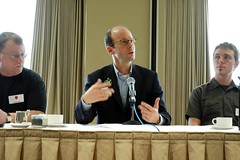
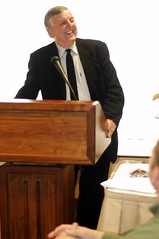
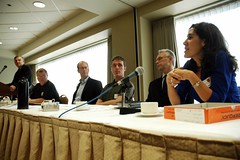
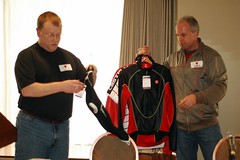
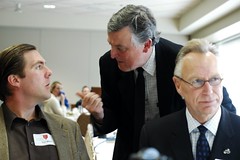
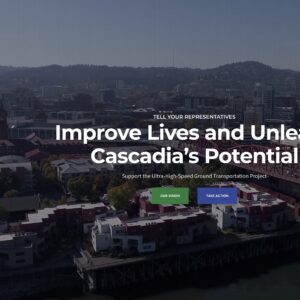
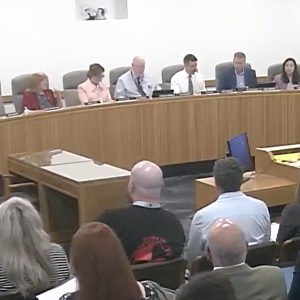
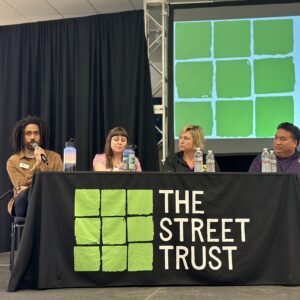
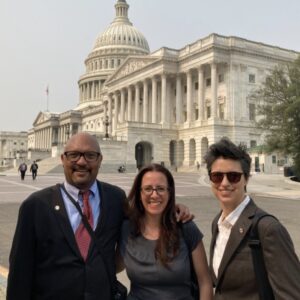
Thanks for reading.
BikePortland has served this community with independent community journalism since 2005. We rely on subscriptions from readers like you to survive. Your financial support is vital in keeping this valuable resource alive and well.
Please subscribe today to strengthen and expand our work.
Finally — bikes are at last being recognized for something they do (boost the economy through jobs, sales, and tourism) instead of something they don’t do (don’t harm the environment, don’t create congestion problems, don’t cost too much to users). That change, which seems like it’s been coming slowly over the past year or two, will really make a difference. Thanks for keeping us in the loop, Jonathan.
Sorry I missed this event, it sounds like a great way to translate the business impact of cycling to a crowd that listens when money talks. Thinking on the number of cycling brands that have moved to Portland recently and our homegrown industry & culture, I look at what is happening in the SLC/Ogden/Park City area of Utah that has brought in Salomon, Rossignal, and numerous other major brands and made itself the North American hub of snowsports companies. Wouldn’t it be cool if we could keep the momentum going in Portland to build our town (or this corner of Oregon) into the cycling industry capital of North America? We’re the geographically closest port to Taiwan (where so many bikes are made), we have the rail and freight infrastruture, a population that is educated and interested not to mention full of “fitness” industry vets from Nike and addidas, a lower cost of living than a lot of the country, and success stories ranging from Yakima to Chris King to DaKine in Hood River. Maybe a with few tax breaks and government ambassadors to the industry and some aggressive recruitment and we can get more of the bike industry here.
I think this is arguably the most important post ever here on bikeportland. The popular recognition of the economic impact of cycling will do more to advance bike rights than almost anything else, for better or for worse. It’s unfortunate that this has yet to generate more interest from the readership. I’d like to encourage everyone who reads this article to think about how we can communicate the economic value of cycling to others, especially our elected representatives.
Great story. Bikes have been around for a long time, but I’ve seen more new things connected with bikes in the last 5 years in Portland (and usually in this blog first!) than I ever saw in the 40 years before that. There are sound business opportunities for innovation and service, and it’s mostly money that gets invested locally.
While I’m “commenting”, let me stray from topic a little: I’ve noticed recently a curious feeling come over me when I ride. Even if I’m the only cyclist on my street, just going along, moving my pedals, whatever, by myself, I feel like I’m part of this huge interesting community of cyclists. People riding vehicles like mine, facing the elements, moving about the same speed, with similar joys and concerns. Very curious – when I ride, I feel like I “belong” to something. My car has never given me this sensation, even when I’m stuck on I-5 waiting for a bridge to come back down.
Alan–
Interesting that you should say that about your feeling of ‘belonging.’
About 8 years ago when my car got totaled, it was about 6 months before I could afford even a modestly priced bike. I was so frustrated, not only by the lack of transportation, but because one trip to Citybikes made me realize there was actually a cycling community and I couldn’t wait to join it! I finally did get a bike in late August (RIP KHS MTB!), did my first winter commute and then my first group ride, the Bike Gallery new year’s day ride and I’ve been pedaling strong every since.
It’s been great watching the community evolve over the years (though sadly, you can still count people of color at bike events on one hand with two fingers missing…)
Kronda,
You’ve got the ‘feeling’ too! So I’m not the only one then.
I agree with you about Portland bike demographics, lots of whitebread on two wheels (and that includes me), but let’s keep riding and see where it takes us.
I’ve lived in inner NE for 18 years. Nearly all of my rides in the early years took me to work (SE) or downtown, but that’s really changed. There are getting to be just as many routes I like to ride north of Fremont as there are south. And whenever I (very tall guy) ride my Bike Friday (very little wheels) down a quiet street, people stare and point at me regardless of the shading of their skin. Not exactly a metaphor from a Martin Luther King speech, but I think we’re headed in the right direction.
By the way, if you do ever see a tall guy on a red Friday, come over and say ‘hi’! I’ll be waiting.